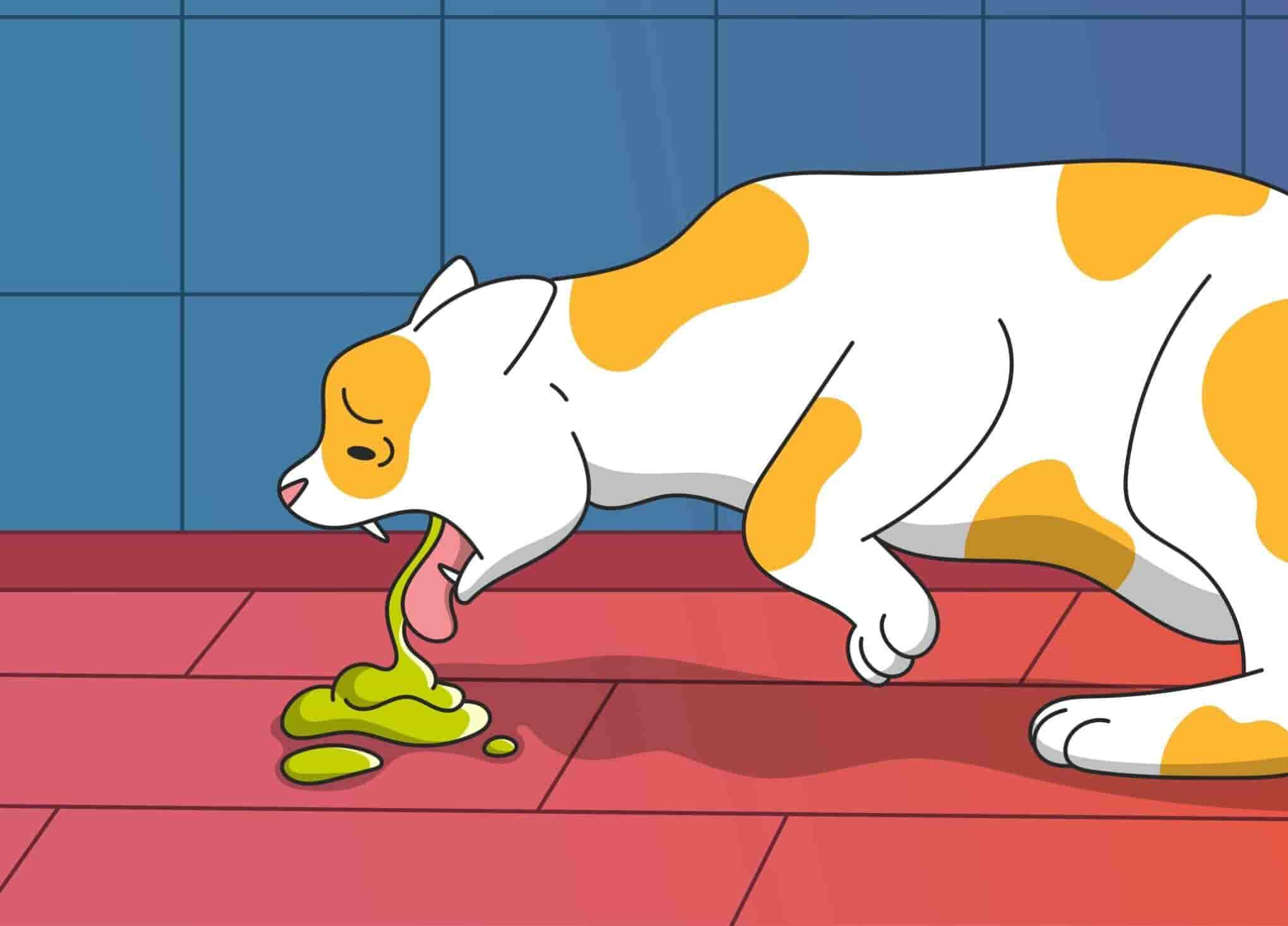Fact: Cats vomit. It’s just what they do! But aside from being a little gross, your cat’s vomiting might actually seem a little scary. Some causes are more serious than others.
Vomiting can be a sign of a medical emergency, so it's important to be aware of the potential causes and to contact a veterinarian if your cat is vomiting frequently or if the vomiting is accompanied by other signs of illness.
Here’s what you need to know about what causes feline vomiting and how you can help.
Stop Googling - Ask a Real Vet
Vomiting, Acute Vomiting, or Chronic Vomiting?
There’s a significant difference between a cat who vomits occasionally, one who is vomiting uncontrollably, and one who seems to vomit all the time. According to research, each kind of vomiting suggests different causes and necessitates a different course of treatment.
Feline Vomiting: Most cats vomit occasionally. For some cats this can happen once or twice a month; for others, vomiting might only happen a few times a year.
Acute Feline Vomiting: Acute vomiting is usually very sudden and can be quite uncomfortable for your cat and/or involve a significant volume of vomit.
Chronic Feline Vomiting: Chronic vomiting occurs on a regular basis – more than several times a week - and might not even seem to phase your cat.
In fact, if you are worried that you can't always check on your cat because you're gone for work and your kitty might be vomiting home alone (yes, they can), consider using Petcube's interactive cat camera. This way you will always be in touch with your furry companion and will have the recorded history of their time without you at home.
Pet Keen has recently reviewed Petcube's Bites 2 Lite camera, and here is what they say in their article:
"The Petcube Bites 2 Lite provides fantastic value. The price is much more affordable than other treat dispensing cameras on the market. While other brands sacrifice quality to bring consumers a cheap product, Petcube seems to have found a way to keep the price low while also providing a high-quality product."
The Causes of Vomiting in Cats
There are dozens of reasons your cat might vomit. Remember that the kind of vomiting your cat suffers from (occasional, acute, or chronic) probably has a lot to do with the root cause, and it's better to consult with a veterinarian. Consider Online Vet by Petcube with its 24/7 on-call veterinarians ready to help you out with your pet's health issues.
Here are some of the most common reasons cats might vomit:
1. Ingestion of Substances
Sudden, acute vomiting is often induced by the ingestion of something that disagrees with your cat’s stomach. These substances can range from relatively harmless (spoiled food, bitter leaves) to life-threatening (human medications, poisonous chemicals, string, or yarn). If you suspect your cat has eaten something that is causing them to vomit, consult a vet immediately.
2. Hairballs
Hairballs are damp, undigested wads of hair; almost all cats get them. Vomiting up a hairball is usually accompanied by hacking noises and spasms and of course, the expulsion of a ball of hair. Most hairballs come out relatively easily, but if your cat can’t seem to get one out, talk to your vet about whether or not it might eventually cause intestinal blockage.
Read more: How To Help Your Cat Pass a Hairball
3. Bacteria, Viruses, or Parasites
Certain bacterial and viral infections within your cat’s intestinal tract can result in vomiting. Likewise, a gastrointestinal parasite might induce regular vomiting in a cat who can’t process food properly.
4. Chronic Disease
Vomiting can be a symptom of a number of chronic – sometimes undetected – diseases. Acute kidney failure, acute liver failure, gall bladder inflammation, colitis, gastritis, and pancreatitis are some of the most common. A qualified vet can evaluate your vet for these diseases and suggest a treatment plan.
5. Change in Diet
An often-overlooked cause of vomiting is a change in a cat’s diet. If you’ve recently changed your cat’s food, added new foods, or even started a course of feline medication, nausea and/or indigestion may result. If this is the root cause, the vomiting should eventually subside.
Cat Vomit Color Chart
The vomit of a healthy cat is usually pale yellow or clear. If your cat vomit is a different color, it could indicate a health problem. The following vomit color chart will help you determine the meaning and treatment of your cat's vomit.
Pale yellow or clear
- What it means: If you see your cat vomiting clear liquid or pale yellow - it is normal and not cause for concern;
- Treatment: You're all good!
Orange
- What it means: Cat vomiting orange could be a sign of liver disease or pancreatitis;
- Treatment: If your cat is vomiting orange liquid frequently, take them to the vet for an examination.
Yellowish green
- What it means: Yellow cat vomit (or yellowish green) is a sign of bile build-up or liver disease;
- Treatment: If your cat is vomiting yellowish green liquid frequently, take them to the vet for an examination.
Bright red
- What it means: This could be a sign of blood in cat vomit;
- Treatment: If your cat is vomiting bright red liquid, take them to the vet immediately.
Brown
- What it means: Brown cat vomit could be a sign of blood in the vomit;
- Treatment: If you see your cat vomiting brown, take them to the vet immediately.
Black
- What it means: This could be a sign of blood in the vomit;
- Treatment: If your cat is vomiting black liquid, take them to the vet immediately.
White
- What it means: White cat vomit could be a sign of milk build-up or an upset stomach;
- Treatment: If your cat is vomiting white liquid, give them small amounts of milk or water to drink and see if the vomiting subsides.
Clear, watery diarrhea
- What it means: Cat vomiting water could be a sign of dehydration;
- Treatment: If your cat is vomiting clear, watery diarrhea, give them small amounts of milk or water to drink and see if the vomiting subsides.
If your cat is vomiting frequently or excessively, take them to the vet for an examination. Excessive vomiting can lead to dehydration, which can be dangerous for cats.
How You Can Help a Vomiting Cat
While your cat is vomiting, stay out of their way but be sure they're in a safe location. Re-hydration is important after vomiting, but most vets recommend waiting around two hours after an episode of vomiting to offer your cat any water or bland food.
Don’t let your cat eat their expelled vomit, even if they try. If you’re unsure what caused the vomiting, consider keeping a sample of the vomit to give to your vet for testing.
If your cat’s vomiting is severe or frequent, you’ll want to talk to your vet. They may recommend fluid therapy or anti-emetic medication until your cat feels better. They might also want to test or evaluate your cat for any underlying causes like disease or infection.
When in doubt about your cat’s vomiting, talk to your vet!
Online Vet and Emergency Fund by Petcube
You may have thought "It would be great to send a picture of your cat's vomit color to a professional veterinarian and get their expert opinion on it." Well, the awesome news is that you CAN actually do it with Petcube's awesome pet health subscriptions.
Online Vet by Petcube is a service that can provide you with security and safety for your pet. Online Vet gives you an opportunity to have a 24/7 online vet visit and talk to a certified online vet anytime you have a question. The service offers professional help from a team of certified veterinarians — for only $20 per month.
Moreover, for just $9 more a month, you can also subscribe for an emergency fund which allows you to get $3,000 in an emergency for up to six pets. This service updated the traditional pet insurance to meet the most common emergency needs (such as increased cat vomiting and diarrhea!) at an affordable price.
Read more: What To Expect From An Online Vet Visit
Conclusion
It may seem uncomfortable and scary to see your cat vomiting. Although it is a normal health behavior for both humans and cats, if your cat starts to vomit excessively or if you notice any other not-so-normal symptoms about it (such as cat vomiting blood) - make sure to connect with a vet as soon as possible.
We would not suggest any home remedies for cat vomiting, as the best course of action would be to discuss the issues directly with the vet.
Was this article helpful?
Help us make our articles even better










